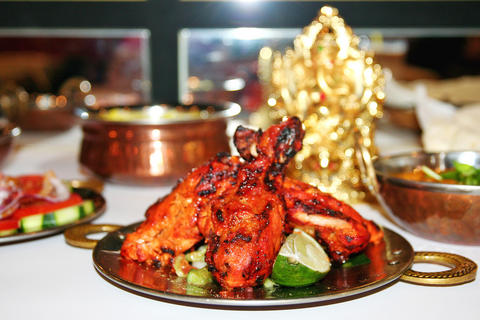It's not an inventive name for a restaurant but Calcutta Indian Food does what it says well. The brother-sister owners are Taiwanese from the West Bengal city and opened the restaurant in Ximending a couple of months ago. Hou Yong-tian (侯勇添) used to be the chef at Spice Shop in Tianmu, so the kitchen has pedigree.
Foreigners, including Indians, form a large portion of the pair's clientele, but locals are being lured in by competitively priced set meals in the week. These range from NT$190 for the vegetarian curry and NT$280 for the lamb, including a salad, soup or drink, nan bread or rice.
Most of the Indian subcontinent's better-known dishes are listed on the menu ("hot and spicy vindaloo," bhuna and madras) but the spicy hot lamb curry mass kolhapuri (a Marathi dish) was a surprise and there is an emphasis on creamy flavors such as pasanda and murgi malai. Side dishes are plentiful and the fiery laccha, a "Delhi-spice salad" is worth trying. Rice is saffron colored and there is a selection of nan breads.

PHOTO: JULES QUARTLY, TAIPEI TIMES
I've visited five or six times and the food has always been of a good standard. It is North Indian in character, according to the owners, tending toward stronger flavors. An example of this was the chicken tandoori, bright orange and baked until it was ever-so-slightly charred. The chicken was good quality and far removed in taste from some of the fake tandooris served up in this city.
Other highlights of previous meals included the iced Darjeeling tea, lemon soda, daal soup and a refreshing homemade milk rice dessert called firni. The channa masala, a chickpea dish with a sweetness balanced by a firm but fair chili kick, come recommended. The raita yogurt is a favorite with many Taiwanese, we were informed, and teased the taste buds. The worst crime as far as Indian food is concerned, is being boring.
The decor will be familiar to lovers of Indian food around the world: Colonial-period, patterned wallpaper in a deep ochre red, a mini chandelier, a few brass fittings and a couple of India-themed pictures. In addition to the usual "fortune cat" (招財貓) waving his paw at the cash desk there is a brass statue of Ganesh the elephant god. Service is informal and friendly.

Many people noticed the flood of pro-China propaganda across a number of venues in recent weeks that looks like a coordinated assault on US Taiwan policy. It does look like an effort intended to influence the US before the meeting between US President Donald Trump and Chinese dictator Xi Jinping (習近平) over the weekend. Jennifer Kavanagh’s piece in the New York Times in September appears to be the opening strike of the current campaign. She followed up last week in the Lowy Interpreter, blaming the US for causing the PRC to escalate in the Philippines and Taiwan, saying that as

Taiwan can often feel woefully behind on global trends, from fashion to food, and influences can sometimes feel like the last on the metaphorical bandwagon. In the West, suddenly every burger is being smashed and honey has become “hot” and we’re all drinking orange wine. But it took a good while for a smash burger in Taipei to come across my radar. For the uninitiated, a smash burger is, well, a normal burger patty but smashed flat. Originally, I didn’t understand. Surely the best part of a burger is the thick patty with all the juiciness of the beef, the

This year’s Miss Universe in Thailand has been marred by ugly drama, with allegations of an insult to a beauty queen’s intellect, a walkout by pageant contestants and a tearful tantrum by the host. More than 120 women from across the world have gathered in Thailand, vying to be crowned Miss Universe in a contest considered one of the “big four” of global beauty pageants. But the runup has been dominated by the off-stage antics of the coiffed contestants and their Thai hosts, escalating into a feminist firestorm drawing the attention of Mexico’s president. On Tuesday, Mexican delegate Fatima Bosch staged a

Would you eat lab-grown chocolate? I requested a sample from California Cultured, a Sacramento-based company. Its chocolate, not yet commercially available, is made with techniques that have previously been used to synthesize other bioactive products like certain plant-derived pharmaceuticals for commercial sale. A few days later, it arrives. The morsel, barely bigger than a coffee bean, is supposed to be the flavor equivalent of a 70 percent to 80 percent dark chocolate. I tear open its sealed packet and a chocolatey aroma escapes — so far, so good. I pop it in my mouth. Slightly waxy and distinctly bitter, it boasts those bright,